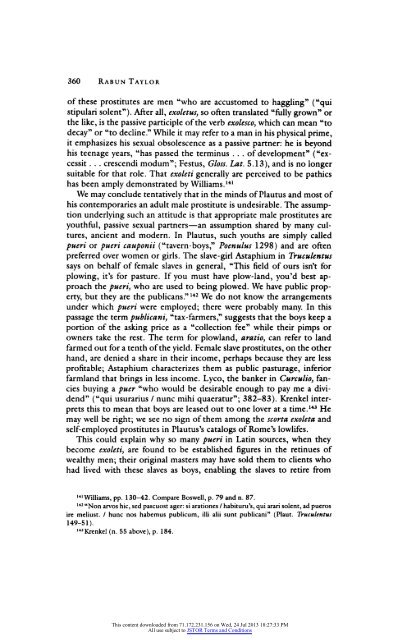Two Pathic Subcultures in Ancient Rome
Two Pathic Subcultures in Ancient Rome
Two Pathic Subcultures in Ancient Rome
Create successful ePaper yourself
Turn your PDF publications into a flip-book with our unique Google optimized e-Paper software.
360 RABUN TAYLOR<br />
of these prostitutes are men "who are accustomed to haggl<strong>in</strong>g" ("qui<br />
stipulari solent"). After all, exoletus, so often translated "fully grown" or<br />
the like, is the passive participle of the verb exolesco, which can mean "to<br />
decay" or "to decl<strong>in</strong>e." While it may refer to a man <strong>in</strong> his physical prime,<br />
it emphasizes his sexual obsolescence as a passive partner: he is beyond<br />
his teenage years, "has passed the term<strong>in</strong>us . . . of development" ("excessit<br />
. . . crescendi modum"; Festus, Gloss. Lat. 5.13), and is no longer<br />
suitable for that role. That exoleti generally are perceived to be pathics<br />
has been amply demonstrated by Williams.'4'<br />
We may conclude tentatively that <strong>in</strong> the m<strong>in</strong>ds of Plautus and most of<br />
his contemporaries an adult male prostitute is undesirable. The assumption<br />
underly<strong>in</strong>g such an attitude is that appropriate male prostitutes are<br />
youthful, passive sexual partners-an assumption shared by many cultures,<br />
ancient and modern. In Plautus, such youths are simply called<br />
pueri or pueri cauponii ("tavern-boys," Poenulus 1298) and are often<br />
preferred over women or girls. The slave-girl Astaphium <strong>in</strong> Truculentus<br />
says on behalf of female slaves <strong>in</strong> general, "This field of ours isn't for<br />
plow<strong>in</strong>g, it's for pasture. If you must have plow-land, you'd best approach<br />
the pueri, who are used to be<strong>in</strong>g plowed. We have public property,<br />
but they are the publicans." 142 We do not know the arrangements<br />
under which pueri were employed; there were probably many. In this<br />
passage the term publicani, "tax-farmers," suggests that the boys keep a<br />
portion of the ask<strong>in</strong>g price as a "collection fee" while their pimps or<br />
owners take the rest. The term for plowland, aratio, can refer to land<br />
farmed out for a tenth of the yield. Female slave prostitutes, on the other<br />
hand, are denied a share <strong>in</strong> their <strong>in</strong>come, perhaps because they are less<br />
profitable; Astaphium characterizes them as public pasturage, <strong>in</strong>ferior<br />
farmland that br<strong>in</strong>gs <strong>in</strong> less <strong>in</strong>come. Lyco, the banker <strong>in</strong> Curculio, fancies<br />
buy<strong>in</strong>g a puer "who would be desirable enough to pay me a dividend"<br />
("qui usurarius / nunc mihi quaeratur"; 382-83). Krenkel <strong>in</strong>terprets<br />
this to mean that boys are leased out to one lover at a time.'43 He<br />
may well be right; we see no sign of them among the scorta exoleta and<br />
self-employed prostitutes <strong>in</strong> Plautus's catalogs of <strong>Rome</strong>'s lowlifes.<br />
This could expla<strong>in</strong> why so many pueri <strong>in</strong> Lat<strong>in</strong> sources, when they<br />
become exoleti, are found to be established figures <strong>in</strong> the ret<strong>in</strong>ues of<br />
wealthy men; their orig<strong>in</strong>al masters may have sold them to clients who<br />
had lived with these slaves as boys, enabl<strong>in</strong>g the slaves to retire from<br />
141Williams, pp. 130-42. Compare Boswell, p. 79 and n. 87.<br />
142 4Non arvos hic, sed pascuost ager: si arationes / habituru's, qui arari solent, ad pueros<br />
ire meliust. I hunc nos habemus publicum, illi alii sunt publicani" (Plaut. Trucukntus<br />
149-51).<br />
143 Krenkel (n. 55 above), p. 184.<br />
This content downloaded from 71.172.231.156 on Wed, 24 Jul 2013 18:27:33 PM<br />
All use subject to JSTOR Terms and Conditions
















